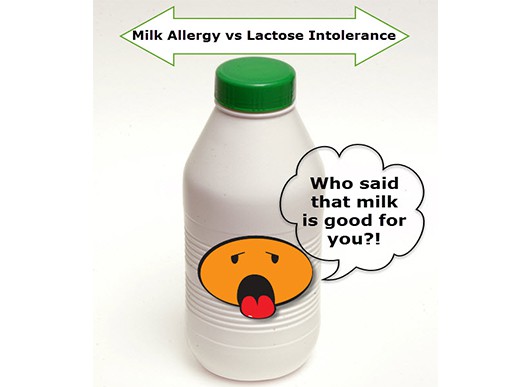What are the differences between food allergy and food intolerance?
In a previous post, I wrote about lactose intolerance and what it means for IBS sufferers. For this post I have researched the subject of milk allergy and its effects on people dealing with IBS and also investigated the difference between these two ailments.
First of all it is important to understand the difference between food allergy and food intolerance.
Food allergy causes an immune system reaction that affects numerous organs in the body, which could be serious or even life threatening. It happens when someone consumes food that he or she is allergic to, causing the body to produce antibodies and create symptoms like face swelling, itching, difficulty breathing, vomiting, abdominal pain, diarrhea etc. Food allergies can compromise the absorption of nutrients thus causing iron deficiency or even anemia as well as other illnesses.
A food allergy can usually be identified by performing an allergy test.
Food intolerance symptoms are usually less serious and often limited to digestive problems. With food intolerance, individuals could still eat small amount of the food they are intolerant to, usually without serious consequences. It is more difficult to diagnose a food intolerance and this is usually done by eliminating one or more food, you may be intolerant to, for a few weeks and then slowly reintroduce those foods one at the time to identify which one causes the problem.
What is Milk Allergy?
Cow’s milk is made of various components, including:
- proteins (e.g. casein and whey)
- milk sugar (lactose)
- fat
Milk allergy occurs when a person’s immune system has a negative reaction to one of the 25 different proteins that can be found in milk, like casein. When you ingest milk products in any form, it triggers these adverse reactions in your immune system which may present in the following ways:
- Break out of hives, dry skin
- Stomach pain, diarrhea, vomiting, etc
- Coughing, breathing difficulties, swelling of the throat and/or lips, itching in eyes etc
A mild reaction will result in skin conditions and itching, but a severe reaction may cause anaphylaxis and can be life threatening.
Cow’s milk allergy mostly affects very young children, but fortunately the majority (around 80%) will no longer be allergic by the time they go to school. Some children retain the dairy allergy into their adult life, but even if rare, it is also possible that some people become allergic to dairies later on in life.
When purchasing processed food, ingredients labels should always be read, as often milk is found as additives in products like breakfast cereals, breads, biscuits, crackers, chocolate, sauces etc.
If you think that you or your child are allergic to milk, your GP may refer you to an allergist specialist to perform a blood test for antibodies to dairy products.
How is Lactose Intolerance Different from Milk Allergy?
People often confuse milk allergy with lactose intolerance because they sometimes present similar types of symptoms. In fact, the two conditions are vastly different.
The major difference between milk allergy and lactose intolerance is the fact that, the immune system has nothing to do with the latter. As I have mentioned in a previous post regarding lactose intolerance, most dairy products, including milk, contain a sugar called Lactose. Lactose intolerant patients lack an enzyme called lactase, which helps to digest dairy foods. The lack of lactase caused the lactose to remain in the gut and feed the gut bacteria, hence causing the individual to suffer from various stomach issues.
Lactose intolerance is a food sensitivity and not an allergy, because it is not an immune response, but rather a problem with digestion caused by lactase deficiency.
Milk allergy is a real food allergy, with specific symptoms that occur when the presence of milk proteins trigger an immune reaction, in some cases it could be life-threatening causing breathing problems, by the narrowing the airways (anaphylaxis).
People who have lactose intolerance can often still have small amounts of dairies, like hard cheeses, without any issues.
Milk Allergy and IBS
Milk allergy is usually established in early childhood, mostly during infancy (affects around 3-6% of children under 3 years old). As children grow up, they lose the sensitivity to milk and can consume dairy products. It is uncommon for an adult to suffer from this allergy, which is why it is often confused with lactose intolerance and IBS.
Lactose Intolerance and IBS
Lactose intolerance is quite common and increases with age, therefore common with elderly people. Studies prove that there is a direct link between lactose intolerance and IBS and IBS sufferers can actually improve their symptoms by eliminating products containing lactose from their diet. Your doctor may be able to advise on this and possibly get you to do a HBT (hydrogen breath test); to find out exactly what type of intolerance you have, so you can make the proper dietary adjustments. Following a Low-FODMAP diet plan, can also help in controlling IBS symptoms effectively.
References
ASCIA: http://www.allergy.org.au/health-professionals/hp-information/asthma-and-allergy/cows-milk-dairy-allergy
IBS Treatment Centre: http://ibstreatmentcenter.com/2014/03/lactose-intolerance-digestive-problems%E2%80%A8.html
Everyday Health: http://www.everydayhealth.com/digestive-health/milk-allergy-vs-lactose-intolerance.aspx
Mayo Clinic: http://www.mayoclinic.org/diseases-conditions/milk-allergy/basics/symptoms/con-20032147



Damn! I’ve been drinking whole organic milk like crazy lately, after years of thinking milk was disgusting…. Guess I’m going to have to stop, ASAP!
Hi Brenda, thank you for your comment. Are you having IBS symptoms after drinking the milk? Milk is high FODMAP, but if you are not lactose intolerant, maybe you are ok to drink it…For a list of low FODMAP milks, you can check out my other article: https://www.lowfodmapdiets.com/lactose-free-milk/
All the best, Larah